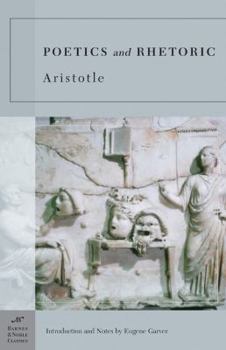The Rhetoric/The Poetics
Select Format
Select Condition 
Book Overview
&&LDIV&&R&&LDIV&&R&&LDIV&&R&&LI&&RPoetics and Rhetoric&&L/I&&R, by &&LSTRONG&&RAristotle&&L/B&&R&&L/B&&R, is part of the &&LI&&RBarnes & Noble Classics&&L/I&&R&&LI&&R &&L/I&&Rseries, which offers quality editions at affordable prices to the student and the general reader, including new scholarship, thoughtful design, and pages of carefully crafted extras. Here are some of the remarkable features of &&LI&&RBarnes & Noble Classics&&L/I&&R: &&LDIV&&RNew introductions commissioned from todays top writers and scholars Biographies of the authors Chronologies of contemporary historical, biographical, and cultural events Footnotes and endnotes Selective discussions of imitations, parodies, poems, books, plays, paintings, operas, statuary, and films inspired by the work Comments by other famous authors Study questions to challenge the readers viewpoints and expectations Bibliographies for further reading Indices & Glossaries, when appropriateAll editions are beautifully designed and are printed to superior specifications; some include illustrations of historical interest. &&LI&&RBarnes & Noble Classics &&L/I&&Rpulls together a constellation of influences--biographical, historical, and literary--to enrich each readers understanding of these enduring works.&&L/DIV&&R&&L/DIV&&R&&LP style="MARGIN: 0in 0in 0pt"&&R &&L/P&&R&&LP style="MARGIN: 0in 0in 0pt"&&RIt is no exaggeration to say that all Western literary criticism flows from &&LB&&RAristotle&&L/B&&R. In the &&LI&&RPoetics&&L/I&&R he focuses mainly on drama, especially tragedy, and introduces ideas that are still being debated more than two thousand years later. Among them is the often misunderstood theory of the unities of action, place, and time, as well as such concepts as: art as a form of imitation, and drama as an imitation of human actions; plot as a drama's central element, and "reversal" and "recognition" as important elements within a plot; and the purging of pity and fear from the audience as the function of tragedy. Rather than offer these ideas merely as abstract theories, Aristotle applies them in cogent analyses of the classic Greek dramas--the tragedies of Aeschylus, Sophocles, and Euripides.&&L/P&&R&&LP style="MARGIN: 0in 0in 0pt"&&R &&L/P&&R&&LP style="MARGIN: 0in 0in 0pt"&&RIn the &&LI&&RRhetoric&&L/I&&R, Aristotle turns to the principles of persuasive writing, including argumentation and the logical development of proof, appeals to emotion, and matters of delivery and style. Perhaps most essentially, Aristotle teaches us how to engage in the central civic activities of accusing and defending, recommending policies, and proving and refuting ideas.&&L/P&&R&&LP style="MARGIN: 0in 0in 0pt"&&R &&L/P&&R&&LP style="MARGIN: 0in 0in 0pt"&&RThese two foundational works are key documents for understanding the culture and politics of Western civilization, and how they continue to evolve today.&&L/P&&R&&LP style="MARGIN: 0in 0in 0pt"&&R &&L/P&&R&&LDIV&&R&&LSTRONG&&REugene Garver&&L/B&&R&&L/B&&R is Regents Professor of Philosophy at Saint John's University, Collegeville, Minnesota. He is the author of &&LI&&RMachiavelli and the History of Prudence&&L/I&&R, &&LI&&RAristotle's Rhetoric: An Art of Character&&L/I&&R, &&LI&&RFor the Sake of Argument: Practical Reasoning, Character, and the Ethics of Belief&&L/I&&R, and the forthcoming &&LI&&RLiving with Thought: A Confrontation with Aristotle's Ethics&&L/I&&R.&&L/DIV&&R&&L/DIV&&R&&L/DIV&&R
Format:Paperback
Language:English
ISBN:1593083076
ISBN13:9781593083076
Release Date:January 2006
Publisher:Barnes & Noble Classics
Length:576 Pages
Weight:1.11 lbs.
Dimensions:1.5" x 5.3" x 8.0"
Customer Reviews
1 rating
The Capacity of Persuasion
Published by Thriftbooks.com User , 16 years ago
I read these works for a graduate seminar on Aristotle. Definition of Rhetoric- capacity of persuasion. Plato is critical of the Rhetoric and the tragic poetry. Rhetoric is approach to political public speeches in the forum. Plato thought that they clouded the mind and thus created a part of his critique of democracy in general. Plato thinks Socrates was killed by rhetoric used by the Athenian democracy. Plato feared the danger of democracy. Poetry appeals to the base human emotions rhetoric, and poetry block rational truth according to Plato. Rhetoric is psychological force of language vs. logical force of language. Psychology leads people to believe things based on emotions. Speech must appeal to the masses in a democracy. Psychology is persuasion, logic is truth. Deduction and induction is arguing logically. Plato says rhetoric is not a technç, (craft) nor is poetry, because they are undisciplined and not uniform in design. Thus, appeal to psychology and emotion can never be done away with in a democracy, thus Plato abhors them and democracy. Plato calls it sophistry this psychological appeal and democracy requires this to exist, so the problem persists. Plato is clear and consistent in his abhorrence of sophistry and democracy. Aristotle's Rhetoric and Poetics are an alternative to Plato. Aristotle's rhetoric tries to strike a middle position. Aristotle says rhetoric and poetry are a technç, the Rhetoric is a handbook. Aristotle says speaker needs to appeal to appropriate information for the particular setting. Much like a lawyer's argument, not just relying on facts, need to appeal to people's emotions. Aristotle does understand that rhetoric can be used in a harmful way. Aristotle lays out three features in rhetoric: 1. Ethos= character of the speaker, also charisma, speaker earns the audience's trust, use of body language. 2. Pathos= condition of the hearer. 3. Logos= essential bearing on political persuasion, truth. Thus, Plato's concern by definition excludes speech because it deals with emotion. These three conditions must be in play for a speech to be successful. The rhetoric contains a detailed analysis of the different human emotions and how to elicit them in a speech. Aristotle knows the speaker must be a good student of human nature to tap into human emotions. Epistçmç is scientific knowledge. Phronçsis is the capacity of the soul for using education, experience and habit all this is in the ethics. This is the same in political world so politics is not an episteme no scientific reasoning. The things that come up in politics are not deduced scientifically. In politics, humans use deliberation between several possible outcomes unlike math where there is only one correct answer. Political speech is contentious because the nature of politics is contentious. There are two circumstances in rhetoric. 1. Judicial rhetoric has to do with the past like in a court case. 2. Deliberative rhetoric has to






